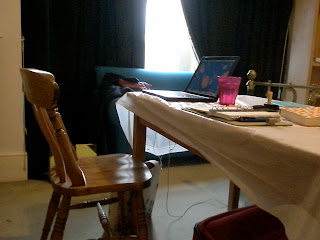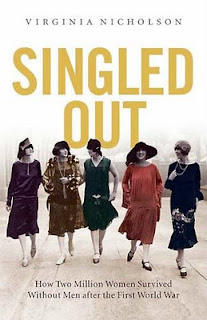Along with a quote from St Francis de Sales: Do not fear what may happen tomorrow: the same everlasting Father who cares for you today will take care of you today and every day. He will either shield you from suffering or will give you unfailing strength to bear it. On the back side of this pocket I have my list of goals for 2012 ("more salad, less dessert" "write and present new paper" etc). I don't have a permanent working space to decorate with inspirational pictures, so this little space is kind of a portable version of that. Aside from the planner and the lip balm, this table is generally a swirl of papers and miscellaneous crap: notes that need some sort of double-checking or copying, scraps of paper with book or archive reference numbers to follow up on, and all those brochures and flyers one acquires through the week that somehow don't deserve to be kept but also don't quite deserve to be thrown away. (I'm sure if I look at this one more time, I'll have the money to attend this conference and it won't conflict with that other thing I signed up for!)
I don't usually last very long sitting at the desk/table, though. The wooden chair is too hard to be able to sit with one leg crossed beneath me, and there isn't enough clearance to cross my legs under the table/desk. So generally after about half an hour (at most) I end up here:
Sitting cross-legged on the bed. (No, not on the sofa, that would be too obvious.) I am an inveterate bed-sitter. I can't help it. Sooner or later I find myself doing everything sitting on the bed. You may be able to tell that this duvet is really lumpy, which makes it difficult to spread all my papers around me; it's a definite downside. But not an enormous problem at this point, since I'm not doing all that much writing yet.
Really, this is where the writing is taking place at the moment:
The green accordion folder (SHAPED LIKE A BOOK! one of my classmates bought this for me after I made a huge, embarrassing deal out of hers) has a manila filing folder for each chapter of the dissertation, as well as some printed-out source lists, a copy of the proposal, etc. The purple "pocket wallet" (as it calls itself) is currently holding two manila folders representing the chapters I'm working on presently. The idea is, I take notes on little A5 sheets of letter paper (just a cheap pad of "writing paper" from CVS or Ryman's or what have you) and then stick them into the relevant chapter folder. This way, if a source is mostly useful for chapter four, but has some little tidbit for chapter six, everything will get included or at least considered. At least, that's how it should work; I get sloppy on a fairly regular basis which is very bad, very bad, must do better.
In conclusion, something for the Arrested Development fans, and a few of the most useful tips from last night's workshop:
- Get as many other people to read your work as possible in order to gain distance from it.
- Don't be precious; the work will change so don't hesitate or agonize over cutting things that need to be cut. Set them aside for future articles or projects.
- It's going well if you're making selections, and it's not going well if you're trying to wedge everything in.
- It's ok to have "bad" writing days; spending a few days filing or reading may seem like procrastination and time wasting, but you'll find that it helps your mind sort things out.
- If you're tearing your hair out trying to write something, you're probably not ready to write it. Stop and go back to your sources.
- When you come across a good introduction in a book, photocopy it and study it.
- Expedite your thinking by writing review pieces of what you've done and its context every week or two.
- To get started on a chapter, think about it strategically: what does it need to do?
- The PhD is your job, it's not your life (although it's inevitably all-consuming in the last two to six months).
That last point, I think, pretty much sums up grad school. It's not a big deal, EXCEPT FOR HOW IT CONSUMES YOUR LIFE.














